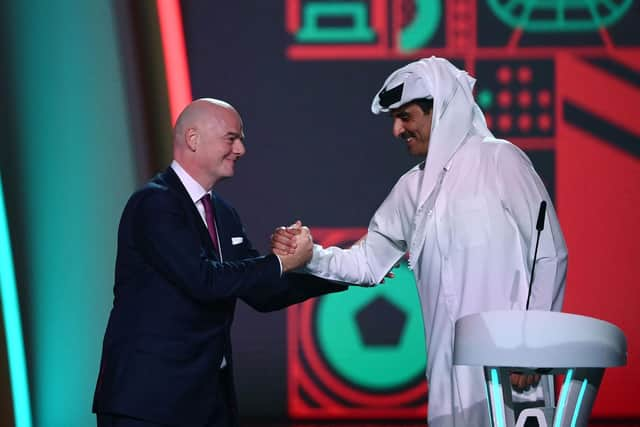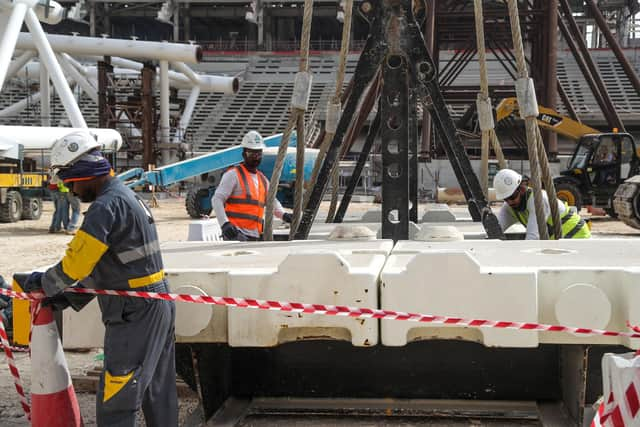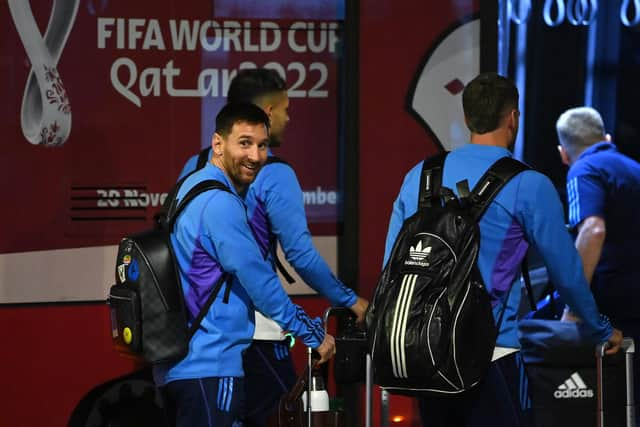Qatar 2022: Forget the human cost and 'focus on the football', or so says Fifa, anyway
Yet, the ignominy is about to implicate all of us football obsessives. An innumerable number who can diarise our past days by referencing events in the quadrennial tournament. A feast of football we live for. And which an appalling number have recently given their lives for. The game's heinous governing body Fifa, even now, continue to play sweep-sweep over the World Cup's first hosting in the Middle East being birthed by death on an horrific scale. That must always be our first thought on these finals, though.
The Qatar World Cup, chillingly, is the competition for our times as a consequence of migrants bearing its cost of being considered utterly disposable. By the time the Qatari national team takes to the field for the competition's opener pitting them against Ecuador on November 20, the International Trade Union Confederation calculates 7,000 migrant workers will have died in desperate, exhaustive, oven-like, labour conditions faced as they constructed the seven stadiums, hotels and accommodation to create necessary infrastructure.
Advertisement
Hide AdAdvertisement
Hide AdThe country's semi-constitutional monarchy government - the "semi" does enormous heavy lifting with the first election held only last year and Emir Sheikh Tamim bin Hamad Al Thani continuing to wield the real power - was latterly shamed into improving working conditions for a labour force that is 95 per cent migrant. But only slightly, with the kafala sponsorship system for foreign workers that ties them to employers effectively reducing them to slave labour. Fifa, a body that has forever bought and sold their morality for the staging of the World Cup, managed to excel themselves when awarding Qatar the finals in 2010. And not just for the fatal abuses of migrants. Qatar runs the full gamut for abuses: women's rights the preserve of controlling men and LGBTQi rights practically non-existent.


Fifa, wouldn't you know though, has directed all the participating countries to "focus on the football" over the next six weeks and to avoid turning the competition into a domain for protest. How dare they cannot begin to cover the response demanded by such callousness. On this front, the Denmark football federation deserves commendation for their "mourning" Hummel kits that will be deep tones of red and black; bloodshed and death and dark aspects of humans' inhumanity surely represented by these hues.
Yet, however awful it is to acknowledge as much, the sportswashing sought by Fifa and Qatar - the pair refusing to engage with the campaign for the families of migrant workers' who have lost their lives to be compensated from the tournament profits - will happen. Because we billions who love football, love this tournament that has no equals in a sporting context, will be willingly complicit. The Qatar World Cup could be considered an invitation for selfloathing; a reason to be repulsed by the human condition. The bald truth is that once the matches start, once we are watching morning, noon, and night as four of them are beamed into our homes daily, the football and all its drama and daring will grab the focus. You can trace right back to the Collisuem games in ancient Rome for our species caring little for the human cost in serving us up our entertainment. In fact, the World Cup itself has grim form for that within its lineage. No-one remembers Argentina in 1978 for the fact its people were then under the yoke of a repressive military junta. Or that in South Africa in 2010 and Brazil in 2014, there were widespread and brutal crackdowns against those in their populaces who dared take to the streets to protest against the austerity imposed on the ordinary citizens. A consequence of the colossal sums of money syphoned off on infrastructure projects to accommodate the tournament. Heavens, only four years ago the naked sportswashing afforded by staging the World Cup in Russia allowed psychopathic president Vladmir Putin - whose waging of war on Ukraine has now sent the global economy into a tailspin - to lord it among world leaders as if some sort of benevolent emperor. As, all the while, the lives of those in same sex relationships were made intolerable.
The inescapable fact is that there is endless intrigue over what will unfold on football pitches in Qatar across the tournament. In part because of the break with usual June/July scheduling that sees the competition take place across November/December. Of course, there is a grim irony in it being moved to this juncture because the 40-degree plus temperatures in the region over summer would have compromised the health and safety of the players. Yet, however the 2022 timeframe has been railed against as an affront by traditionalists, we really shouldn't be too northern hemisphere-centric over it. It is only 12 years since South Africa hosted a World Cup in their winter, after all.
What appears more significant is the condensed nature of the preparatory phase for the finals the scheduling has necessitated. The greatest swathe of players who will be competing in Qatar play their club football in Europe. They will jump from the final encounters in their respective leagues to their first World Cup fixtures, at best, within a fortnight, then. And without any warm-up games. Inevitably, that will leave teams initially undercooked. It could increase the potential for early upsets but, frankly, there appears no compelling reasons to look beyond the favourites Brazil, France, Argentina and Spain for a likely winner. Even if a dark horse such as Denmark shouldn't be entirely discounted. Or four-times winners Germany. England, with their astonishing form nose-dive over the past six months, can comfortably be written off, however.


One of the over-arching themes of the tournament will surround the coterie of recent greats that will be making their farewells to the most lustrous stage.
Which brings us to Lionel Messi and Argentina. The all-time foremost footballing sorcerer has been rejuvenated this season at Paris Saint-Germain and demonstrated, at 34, his wand remains potent. The playmaker's national team have experienced a similar renewal in the past three years - a period across which they haven't tasted defeat and, last year, captured the Copa America. Famously they did so against Brazil in no less than the World Cup specialists Maracana Stadium. Brazil may be the shortest odds to lift the Jules Rimet trophy in Qatar - and at 30 their talisman Neymar may be motivated by his possible last chance to conquer the world - but Argentina would appear to have the edge. Even if 21-year-old forward Rodrygo, with 100 appearances already for Real Madrid, could supply Brazil with vibrant impetus. Argentina have their own performer in that bracket. In 22-year-old Manchester City striker Julian Alvarez they too appear to possess potentially one of the break-out performers of the competition. Argentina are without a World Cup success since the Maradona-inspired success of 1986. It feels like in the first finals since his passing their time could be coming round again. Not least because European nations have a dreadful record in finals played outside of their own continent even if Spain, who have backers in boasting an exciting crop of fresh talent this time around, banished this hex with their triumph in South Africa.
For Argentina to make good on the footballing cognescenti's favour, Messi is likely to be required to put to bed a personal bogey. As with fellow GOAT and equally remarkable goal-plunderer Cristiano Ronaldo - whose ageing, 37-year-old frame has made him a less dynamic figure, while he will head up a patchy Portuguese squad - the attacker has never netted in the knock-out stages of a World Cup. It would seem fitting were Messi and Ronaldo to correct that career anomaly.
Advertisement
Hide AdAdvertisement
Hide AdFrance's ability to escape the holders' curse - no team has backed up a World Cup win with another since Qatar bystanders Italy claimed the honours in 1934 and 1938 - could be wrapped up in usurping the impressive Danes in Group D to secure an easier route through to the final. The Scandic nation provides one genuine heartwarming footballing tale courtesy of Christian Eriksen's presence a year-and-a-half on from his cardiac arrest on the pitch at the delayed Euro 2020. For the French, the force of nature that is PSG predator Kylian Mbappe must figure highly among the likely golden boot winners. His partnership with Real Madrid's Karim Benzema should have rivals' knees knocking. Moreover, Gallic football watchers believe fate could also have played them an unexpectedly welcome hand. Injuries that will rule out Paul Pogba and N'Golo Kanté would seem problematic to outsiders. However, they have opened up places in the engine room for Benzema’s club team-mates Aurélien Tchouaméni and Eduardo Camavinga, heralded in their homeland as the new Patrick Viera and Emmanuel Petit. That pairing was central to France's 1998 World Cup success on home soil - the last time there was a new winner.


Of course, there are endless possibilities as to how the five weeks in Qatar will pan out. The only certainty is that, whatever happens, it will not be worth the cost. No sporting event is worth a single life. However, that fact will be compartmentalised because, if there was a world cup for such capacity, sport has demonstrated it would be forever unrivalled.
Comments
Want to join the conversation? Please or to comment on this article.